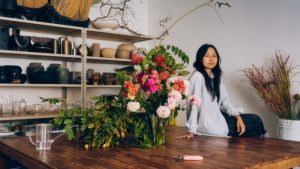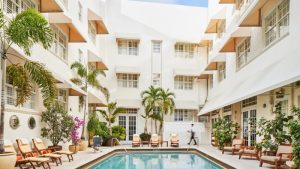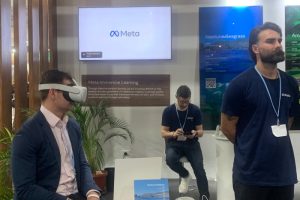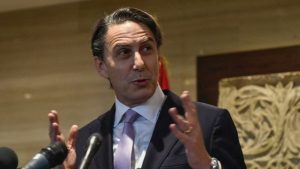Surf’s up! Riding the waves with the boarders of Busua
Unlock the Editor’s Digest for free
Roula Khalaf, Editor of the FT, selects her favourite stories in this weekly newsletter.
Busua is a small fishing village in south-western Ghana. A six-hour drive from Accra, “it’s a place where you feel totally disconnected from the town”, says Sandy Alibo, who first visited in 2016. Working in the action sports division of French telecoms brand Orange, she couldn’t help but take note of Busua’s surfing scene. The conditions were perfect, but “there was no African representation”, she says. “It was a service dedicated to tourists.”
Born in Martinique, Alibo had always felt like the only Black woman in the board sports industry. Visiting Busua gave her a new sense of purpose: to create a truly Ghanaian surf community, befitting the miles of pristine shores lining the country’s southern coast. She made an Instagram account (@surfghana), where local surfing communities could show off their skills, later relocating to Accra to establish a surfing and skateboarding collective. Her role as founder is “not to be a pro surfer or a pro skateboarder”, she clarifies, “but a project manager. I’m surrounded by talent and I observe what they need and how we can help them. Then I reach out to brands and the community, and we build projects together.”


Her first coup came in 2020, when Virgil Abloh supported the construction of the Freedom Skatepark in Accra. It opened in 2021, just 17 days after the designer’s death. “There were maybe 500 people in the skatepark, dancing, performing, skating,” says Alibo. The park closed last year due to a land dispute – “when you build things in Africa you have some challenges” – but Alibo is working to reopen it. In the meantime, her women’s-only Skate Gal Club is going strong, and this summer she arranged for skaters from Ghana, Ethiopia, Senegal and Gabon to travel to Paris and perform on the Olympic ramps. In Busua, Surf Ghana worked with French NGO Paddle-Paddle Surf Project to source 90 surfboards – enough for every aspiring surfer in the village. “A surfboard generally costs a minimum of $600, an annual salary for many Ghanaians,” says Alibo. To create a lasting surf community, however, even more investment is required: wax, leashes, a safe place to store and repair boards, not to mention coaches, clubs and competitions.


All this comes together at Surf Ghana’s Surf House, which opened last year. Built from raffia palm and low-carbon concrete, it’s a beachfront hub with WiFi, a mini-library and a rooftop where young surfers gather for morning yoga. It is also available twice a month as an Airbnb, profits from which are funnelled back into the initiative. “The main goal of Surf Ghana was to develop a local surf community,” says Alibo, “but naturally it created interest among tourists.” She sees this as an opportunity to steer visitors towards Ghanaian-owned businesses: the Ahanta Waves and Justice’s Brothers surf schools in Busua, Loshe’s Surf School in Cape Three Points and Joshua’s Surf School in Kokrobite, close to the capital.
“Surfing is really helping to develop tourism,” says Akwasi McLaren, whose Escape3Points ecolodge in Cape Three Points, Ghana’s southernmost peninsula, creates “alternative economic gain for the local community”. The government is more interested in exporting natural resources than nurturing the tourism industry, he says, “not realising that, when tourists come, they bring money in and leave it in the country”, making a huge impact for more rural zones. He encourages tourists to seek out hotels that engage local farmers, tradespeople and materials. Alibo also recommends Busua Bliss, a stilt house with a garden full of pineapple, moringa and coconut, or the beachfront Ahanta Eco Lodge, where “it feels like home”.


Alibo hopes the skills and resources imparted by Surf Ghana will create a generation of entrepreneurs with their own surf businesses. She ensures local surf schools are certified by the International Surfing Association for this reason. The collective itself has 17 full-time employees: surf and skate coaches, hospitality staff and filmmakers, plus the team at Vibrate Space, a community recording studio launched in collaboration with Spotify and Kendrick Lamar’s company pgLang. Surf Ghana’s photographer, 19-year-old Titus Nyarko, was shooting on his phone when he joined the collective in 2022. Now, supplied with a camera, he has turned the hobby into his profession.
Alibo also wants to raise some world-class surfers. Established earlier this year, Sankofa Surf Club is a team of 14 boys aged between six and 21, who train every day with leading coaches. Girls are welcome, says Alibo, but they currently have their own Obibini Girls Surf Club next door. All of Sankofa’s surfers have access to a scholarship fund, which pays their school fees and expenses while they focus on the sport. The team won its first competition in June against surfers from Ghana and the Ivory Coast at Surf Ghana’s Busua Surfing Day. The goal, says Alibo, “is to have a team of surfers who are ready to compete internationally and put Ghana on the map.”


The Surf Club’s leader is Francis Kelly Kwofie, a 21-year-old Busua native who has worked at the Surf House since graduating high school last year. His fascination with surfing started at the age of nine, “because I saw a lot of people doing it here in Busua”, he says, “but they were all foreigners.” His own chance to surf came when he was 11, when a Spanish coach brought some boards and started teaching local kids. “After three months, he left,” says Kwofie, “and we didn’t have any way to surf again.” Only with the arrival of Surf Ghana was Kwofie able to learn properly.
Aside from staying at the Airbnb, visitors can support the collective by buying crafts and merchandise from its shop. Financial contributions are welcome, as are donations of surf equipment, but “we don’t need clothes”, Alibo emphasises. In return, tourists discover a totally unique surfing experience. “You have to go to Ghana to experience surfing with Afrobeats, surfing with fufu [a west African dish made with cassava and plantain], surfing with a run in the jungle,” says Alibo. “It’s surf culture, made in Ghana.”
#Surfs #upRiding #waves #boarders #Busua







